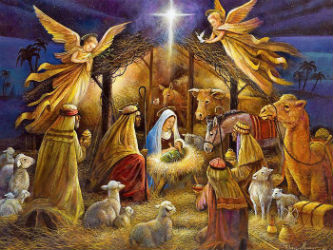My wife, an artist, crafter, and master decorator, paints a different picture every season on the canvas that is our home. For that she draws on decades of crafts she has created and collected, all of which are important but none that rival her collection of crèches’, only thirty of which made the cut for this Christmas.
Few things say so much with so little as a manger scene, but I wonder, are we really listening? If we had to explain the scene to someone who had never heard the story, what would we tell? What is the meaning of that baby in the manger? Why is there a star on top? And what are those angels, shepherds, and wise men all about?
A phrase from Matthew’s version of the Christmas story stands out. It’s a combination of the messianic prophecy in Micah 5:2 and the fulfillment of God’s promise to provide a leader for Israel in 2 Samuel 5:2. “But you, Bethlehem, in the land of Judah, are by no means least among the rulers of Judah; for out of you will come a ruler who will be the shepherd of my people Israel.” (Matthew 2:6).
The phrase that lingers in the air, the one I think we miss at Christmas, is “ruler.” The star pointed the Magi to the one born “king of the Jews.” The shepherds went in haste to see the savior, who is “Christ the Lord.” The angels sang “glory to God in the highest …” Jesus is God, the ruler that would come. Jesus is the Shepherd King.
Kings are not the thing these days. There are only forty-three left in the world, and only eleven who have ruling authority.[1] Rulers make the rules and execute the laws of the land. They are supposed to govern, which means hold back the chaos so endemic to this fallen world. A ruler is one to whom obedience is owed. But we prefer to rule ourselves, and who can blame us? All earthly rulers suffer from the same sinful nature we inherited from Adam and we suffer with them.
But the babe in the manger is no mere earthly ruler. Jesus is the Shepherd King who lays down his life for his friends.
Let’s be real-world about this. What does that mean to a farmer who can’t get his beans out of the field because of the rain? To a sister whose brother hates and despises all she calls good? To a childless couple longing for a family? To the parents of a drug addict? To the children of an adulterer who walked out on his vows? To the man with same-sex attraction who wishes it wasn’t so? To high school teachers who get cussed every day and never see discipline applied? To a small business man working 60-70 hours a week to feed and clothe and educate a growing family? What does it mean in a world, as Jordan Peterson likes to remind us, where chaos is the norm and shalom is rare indeed?
It means many things, among them that chaos will one day come to an end and peace will reign. It means that all who have disobeyed and refused to repent will be punished and that those who have sacrificed for the King in his absence will be rewarded. It means that those who longed for the love of a family will inherit the family of God. That now, even though we cannot see him, we have a shepherd who cares for us, a law that governs us, principles that guide us, his church to encourage us, and his Spirit to empower us through the chaos until the Kingdom comes. It means that we can afford to give ourselves away in love for others, including our enemies, as he gave himself on our behalf knowing that what we do in his name will be remembered by the King when he comes again to rule.
In the unlikely story, with all Herod’s might arrayed against him, of the birth and survival of the baby Jesus we also have the knowledge that what God purposes will get done. No matter what outward appearances indicate, as long as we are aligning ourselves with him, we will share in the glory of the King’s successes and receive his affirmation when he returns.
All hail the Shepherd King who rules and reigns on high
And grace and peace to his faithful ones until the day draws nigh
When he shall come with trumpet blast to take his earthly throne
And bless the world with righteousness when chaos is undone.
[1] https://www.washingtonpost.com/news/worldviews/wp/2013/07/22/meet-the-worlds-other-25-royal-families/?noredirect=on&utm_term=.ae8d33c41cd9
